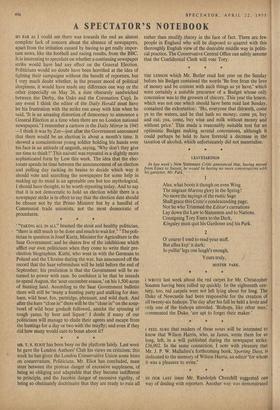A SPECTATOR'S NOTEBOOK
SO FAR as 1 could see there was towards the end an almost complete lack of concern about the absence of newspapers, apart from the irritation caused by having to get really impor- tant news, like the football and racing results, from the BBC. It is interesting to speculate on whether a continuing newspaper strike would have had any effect on the General Election. Politicians would no doubt have been horrified at the idea of fighting their campaigns without the benefit of reporters, but I very much doubt whether, in the present mood of political sleepiness, it would have made any difference one way or the other (especially on May 26, a date obscurely sandwiched between the Derby, the Oaks and the Coronation Cup), In any event I think the editor of the Daily Herald must have let his frustration with the strike run away with him when he said, 'It is an amazing distortion of democracy to announce a General Election at a time when there are no London national newspapers.' I remember a cartoon in the Daily Mirror in 1945 —I think it was by Zec—just after the Government announced that there would be an election in about a month's time. It showed a conscientious young soldier holding his hands over his face in an attitude of anguish, saying, 'Why don't they give me time to think?' This naivete was repeated in a slightly more sophisticated form by Low this week. The idea that the elec- torate spends its time between the announcement of an election and polling day racking its brains to decide which way it should vote and searching the newspapers for some help in making up its mind is an agreeable one but too mythological.
I should have thought, to be worth repeating today. And to say that it is not democratic to hold an election while there is a newspaper strike is in effect to say that the election date should be chosen not by the Prime Minister but by a handful of Communist trade unionists, not the most democratic of procedures.










































 Previous page
Previous page